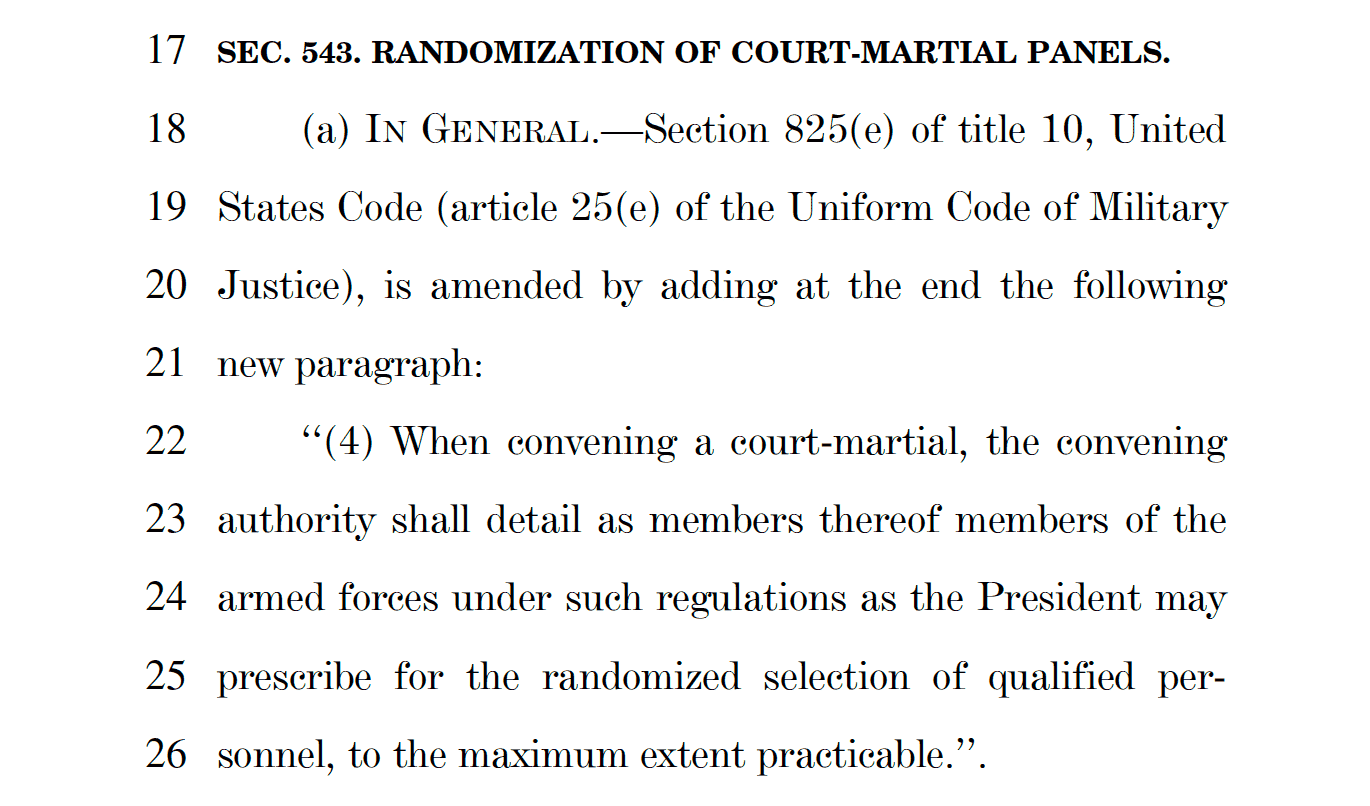On December 23, 2022, President Biden signed the National Defense Authorization Act (NDAA) for Fiscal Year 2023 (FY23) into law. The NDAA contains important updates to military law including recission of the COVID-19 vaccine mandate, expanded judicial review of court-martial convictions, the randomized selection of court-martial members, review of the Army’s titling and indexing practices, and more.
MJA has a proven track record of success and is committed to providing the highest quality legal representation to its clients. If you or a loved one is under investigation or facing court-martial or other adverse action, contact us today for a consultation.
Passage Of The Fy23 National Defense Authorization Act
On December 23, 2022, President Biden signed the NDAA for (FY23) into law. The NDAA contains important updates to military justice and other legal matters including recission of the COVID-19 vaccine mandate, expanded judicial review of court-martial convictions, the randomized selection of court-martial members, review of the Army’s titling and indexing practices, and more.
Randomized Selection Of Court-Martial Members
Service members tried at court-martial for alleged misconduct can have their case heard by a military judge or a jury (panel of members). Article 25, UCMJ, sets forth the criteria and eligibility for those who may serve on a court-martial.
Section 543 of the NDAA randomizes the selection of members detailed to a court-martial:

Article 25 does not currently require that panel members be randomly selected, allowing the Convening Authority to stack the jury with members that he or she believes would be most favorable to the Government’s case.
Unfortunately, the amendment does not take effect until two (2) years after the date the NDAA was enacted and only applies to courts-martial convened on or after that effective date.
Judicial Review Of Court-Martial Convictions
Section 544 of the FY23 NDAA expands the jurisdiction of the Courts of Criminal Appeals, authorizing judicial review of any conviction by a court-martial, regardless of the sentence imposed.
Article 66, UCMJ, governs the military’s Courts of Criminal Appeals. Each branch of the service has a Court of Criminal Appeals which is empowered to review and act on court-martial records by affirming, reversing, or modifying the findings and sentence in certain courts-martial. The Courts of Criminal appeals will automatically review any cases in which the sentence, as approved, includes:
- Death;
- Dismissal of a commissioned officer, cadet or midshipman;
- Dishonorable or bad-conduct discharge; or
- Confinement for 2 years or more.
In other words, if a service member were prosecuted at a General or Special Court-Martial and received a punitive discharge (dismissal, DD, or BCD) OR at least two years of confinement, a CCA will automatically review your case.
The NDAA amends Article 66, UCMJ, to authorize judicial review of any conviction by court-martial—including a summary court-martial—regardless of the sentence imposed. This is a hugely beneficial change that will give service members greater opportunity for relief on appeal.
Section 544 of the FY23 NDAA also clarifies the scope of review in courts-martial reviewed by a service’s Judge Advocate General (JAG). Under the new law, the JAG may modify or set aside, in whole or in part, the findings and sentence of any summary court-martial conviction.
The JAG may also order that a general or special court-martial be reviewed by the Courts of Criminal Appeal if submitted within one year after the end of the 90-day period beginning on the date the accused is provided notice of appellate rights. The JAG may, for good cause, extend the period for submission of an application within the timelines specified under the law.
This amendment does not apply to any matter submitted before the date the NDAA was enacted.
Review Of Army’s Titling And Indexing Practices
Section 549 of the NDAA requires the Secretary of the Army to review the case files of current and former Soldiers and National Guardsman who were titled and indexed in connection with the Guard Recruiting Assistance Program (G-RAP) and the Army Reserve Recruiting Assistance Program (AR-RAP) to determine the “appropriateness of the titling and indexing decision.”
In 2022, the Army’s titling and indexing practices made national news after it was reported that nearly 2,000 Soldiers had false arrest records due to participating in these recruiting programs.
In reviewing a titling and indexing decision, the Secretary of the Army must consider the following factors:
- The likelihood that the member or former member to whom the decision pertains will face future criminal prosecution or other adverse action on the basis of the facts in the record at the time of the review;
- The appropriate evidentiary standard to apply to the review of the decision; and
- Other circumstances or factors that Secretary determines are in the interest of equity and fairness.
Under the NDAA, this review is required to take place within 180 days of the passage of the law.
After completing the review, the Secretary of the Army is required to notify the service member or veteran of the outcome of the review and how they can pursue additional correction, removal, or expungement, if necessary.
If the Secretary of the Army determines that correction, removal, or expungement of a titling or indexing decision is appropriate, the Secretary of the Army may request that service member’s name and personal information be expunged from any law enforcement database and removed from the Defense Central Index of Investigation (DCII).
Contact MJA Today
This blog only covers just a few of the FY23 NDAA’s changes to military justice and other legal matters. The full text of the NDAA is available here.
MJA has a proven track record of success and is committed to providing the highest quality legal representation to its clients. If you or a loved one is under investigation or facing court-martial or other adverse action, contact us today for a consultation.
The post FY23 NDAA Changes to Military Law appeared first on Military Justice Attorneys.

